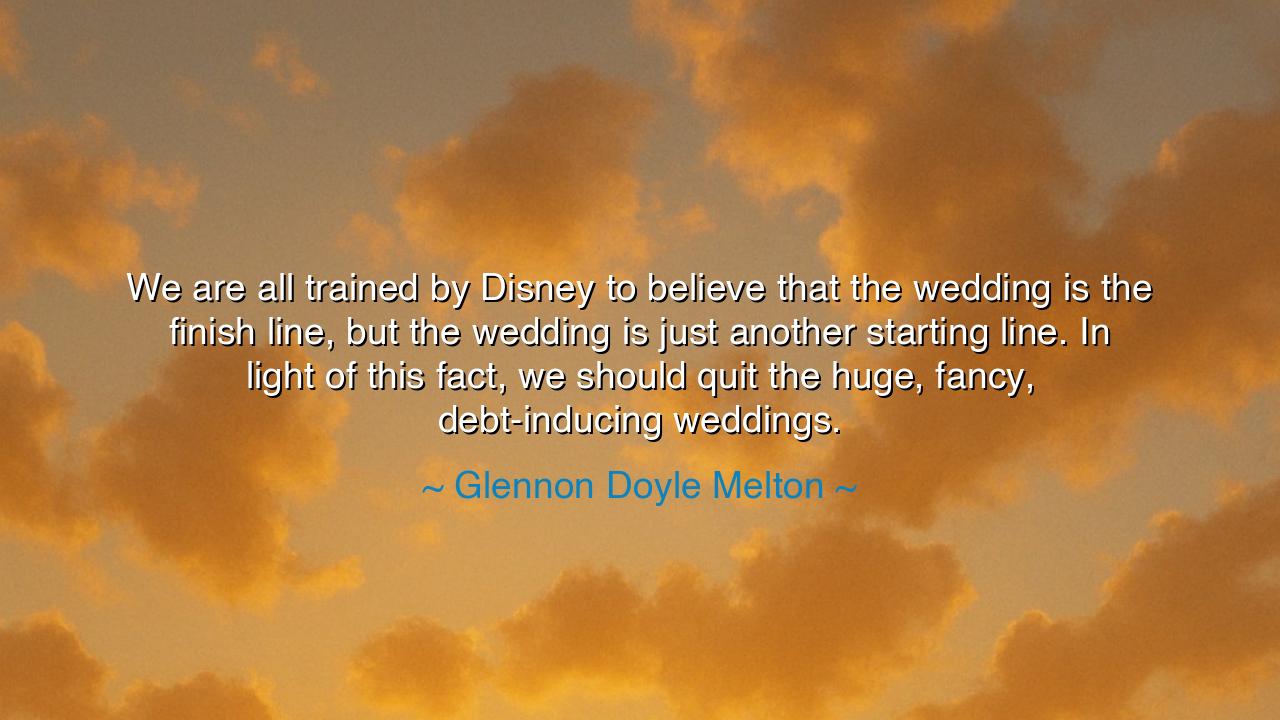
We are all trained by Disney to believe that the wedding is the
We are all trained by Disney to believe that the wedding is the finish line, but the wedding is just another starting line. In light of this fact, we should quit the huge, fancy, debt-inducing weddings.






The words of Glennon Doyle Melton—“We are all trained by Disney to believe that the wedding is the finish line, but the wedding is just another starting line. In light of this fact, we should quit the huge, fancy, debt-inducing weddings.”—are a call to awaken from illusion. They remind us that the wedding is not the end of a journey, nor the prize of love achieved, but the beginning of a new road, demanding endurance, sacrifice, and steadfast devotion. To mistake it for the final triumph is to misunderstand the true nature of marriage.
The Disney dream, with its castles and happy endings, has shaped generations into believing that the story closes with the bride’s veil and the groom’s kiss. Yet life teaches otherwise. The vows spoken at the altar are not the end of striving but the beginning of labor, where two souls learn to walk as one. The starting line of marriage is a threshold into unknown valleys and mountains, where love must be tested not by fantasy, but by reality.
The warning against huge, fancy, debt-inducing weddings is not a dismissal of beauty, but a reminder that splendor without substance is hollow. To mortgage one’s future for a single day is to sacrifice the long journey for the illusion of a grand beginning. History offers the tale of countless monarchs, whose lavish ceremonies glittered with gold, only for their unions to rot in betrayal or collapse in strife. In contrast, the humblest weddings, celebrated in barns or under open skies, often forged bonds that endured the tempests of life.
Consider the union of John and Abigail Adams, who wed without great pomp, yet built a partnership that would sustain through war, separation, and the founding of a nation. Their marriage was not adorned with jewels, but with mutual respect, devotion, and labor for a shared vision. Their life shows us that the true grandeur of marriage lies not in the day it begins, but in the life it builds.
Therefore, O listener, let this be your wisdom: do not confuse the dream for the reality, nor the festival for the covenant. A wedding may be adorned with splendor or clothed in simplicity, but its worth is measured only by the life that follows. Celebrate if you must, but do not drown in debt for a fleeting image of joy. For love’s truest triumph is not the wedding day, but the years that unfold after—the daily choosing, the endless beginning, the shared path walked together toward eternity.






TLNguyen Tung Lam
Glennon Doyle Melton’s comment highlights how the concept of weddings has been distorted by societal expectations. The idea of ‘the wedding as the finish line’ makes people feel pressured to create this grand spectacle. Do you think there’s too much emphasis placed on the wedding day, and not enough on the long-term work of building a marriage? Could smaller, more intimate weddings lead to deeper connections between couples, free from the distractions of overspending?
MTNguyen Manh Trung
Glennon Doyle Melton’s perspective on weddings as a starting line rather than the finish line is such a refreshing take. The idea of moving away from huge, debt-inducing weddings is important, especially as it aligns with the concept of what marriage should truly be about—love and commitment. What would it look like if we prioritized creating meaningful relationships and celebrations, free from the pressure of perfection and debt? How can we shift the focus back to the marriage itself?
KKhanh
I really resonate with Glennon Doyle Melton’s comment about weddings being seen as a starting line. The idea of grand, expensive weddings often seems more about social status than the couple's actual commitment. How much do you think this pressure for a ‘perfect’ wedding is a result of media influences like Disney, and how can we change the narrative to focus more on the partnership rather than the event? Should we be focusing on building the relationship instead of stressing over the ceremony?
NNgocc
Glennon Doyle Melton’s take on weddings as the ‘starting line’ rather than the ‘finish line’ is an eye-opening perspective. It challenges the societal pressure to have this perfect, expensive celebration. Do you think that this shift in how we view weddings could lead to more thoughtful, personal ceremonies that prioritize the marriage itself rather than the spectacle? Could society benefit from viewing marriage as an ongoing journey instead of an event that needs to be celebrated in excess?